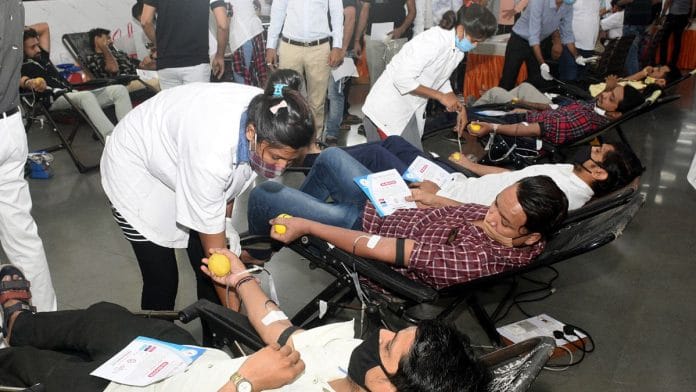New Delhi: Acting on the pleas challenging the blanket ban on blood donation by trans people, gay men and sex workers, the Supreme Court has directed the Union government to obtain expert opinion on how to lift the “discriminatory” aspect of the 2017 blood donor guidelines in the country.
The guidelines on donating blood particularly identify trans persons, gay men, and female sex workers at high risk of contracting Acquired Immunodeficiency Syndrome (AIDS) and Human Immunodeficiency Virus (HIV), and, therefore, do not allow them to donate blood.
A bench of Justices Surya Kant and N Kotiswar Singh, orally observed that the thought of labelling all transgenders as “risky” was worrying and essentially stigmatised these communities.
“Aren’t we creating a kind of segregated group?” the Supreme Court asked Wednesday, adding that “stigma, biases, and prejudices are enhanced” by this.
It asked Centre to consult experts on how the “discriminatory element” of the guidelines could be removed without diluting the precautionary safeguards or compromising medical safety.
“Unless you can provide medical evidence that there is a link between transgenders and these diseases, you cannot say all transgenders are involved in those kinds of [risky] activities,” the two-judge bench said Wednesday, adding anyone could be involved in behaviour that puts them at risk of HIV or AIDS.
What the 2017 guidelines say
The Guidelines on Blood Donor Selection and Blood Donor Referral were issued by the National Blood Transfusion Council and the National Aids Control Organisation on 11 October 2017 to provide a safe, sufficient, and timely supply of blood to those in need.
“These guidelines are designed to promote best practice in Blood Transfusion Services to ensure the collection of donations from the lowest risk donors possible,” the guidelines say.
However, the present case specifically challenges clauses 12 and 51 of the 2017 guidelines that cover ‘Risk Behaviour’ and those who are ‘At risk for HIV infection’ categories of donor selection.
Clause 12 says, “The donor shall be free from any disease transmissible by blood transfusion, as far as can be determined by history and examination” and will not belong to categories considered “at risk” for HIV, Hepatitis B or C infections, whom it identifies as “transgenders, men who have sex with men, female sex workers, injecting drug users, persons with multiple sexual partners, or any other high risk as determined by the medical officer”. Clause 51 “permanently defers” blood donation for those people.
What the plea argued & Centre’s stance
Manipur-based transgender rights activist Thangjam Santa Singh, also known as Santa Khurai, first filed a Public Interest Litigation (PIL) plea in the Supreme Court in 2017 to have clauses 12 and 51.
Khurai argued that the guidelines are unconstitutional and violate the constitutional rights enshrined under Articles 14 (equality), 15 (non-discrimination) and 21 (life).
On 6 February 2023, the Centre had filed its response to the plea by way of an affidavit presented before the Supreme Court, which said that a “robust” blood transfusion system is an essential feature of any country’s healthcare system, without which quality medical care is impossible.
“Blood available in blood banks must not only be safe but also clinically effective, and of appropriate and consistent quality,” it said, adding that the safety and availability of blood is a major public health responsibility.
Underlining that the provision of “safe and quality blood” involves highly complex operations with various stakeholders, and comes with several challenges, the Centre said that all efforts should be made to strengthen the integrity of India’s blood transfusion system so that confidence is instilled in people who have little option but to use it, in “what may perhaps be the most difficult situation in their lives”.
Since this system entirely relies on blood donations, it’s important for both the donor and the receiver to have complete faith in the system, it said.
Adding that these issues fell within the domain of the executive, aided by the medical, scientific and other technical experts, who are guided by evidence and their own professional experience, the Centre said such issues should be judged from the “lens of public health” and not just from an individual rights perspective.
In August last year, this plea was clubbed with two others—one filed by writer, journalist and director of Rainbow Literature Festival, Sharif D Rangnekar, and another filed by Harsh Iyer (2018). The Supreme Court also issued notice to Centre.
(Edited by Sanya Mathur)






